6.2
Act 1 Macbeth
SCENE Scotland; England
Scene 1°
Thunder and lightning. Enter three Witches.
FIRST WITCH When shall we three meet again?
In thunder, lightning, or in rain?
SECOND WITCH When the hurlyburly’s°; done,
When the battle’s lost and won.
5 THIRD WITCH That will be ere the set of sun.
FIRST WITCH Where the place?
SECOND WITCH Upon the heath.
THIRD WITCH There to meet with Macbeth.
FIRST WITCH I come, Grimalkin!°
SECOND WITCH Paddock° calls.
10 THIRD WITCH Anon.°
ALL Fair is foul, and foul is fair.
Hover through the fog and filthy air.
Exeunt.
Scene 2°
Alarum° within. Enter King [Duncan], Malcolm, Donalbain, Lennox, with attendants, meeting a bleeding Captain.
DUNCAN What bloody man is that? He can report,
As seemeth by his plight, of the revolt
The newest state.°
MALCOLM This is the sergeant°
Who like a good and hardy soldier fought
5 ’Gainst my captivity. Hail, brave friend!
Say to the King the knowledge of the broil°
As thou didst leave it.
CAPTAIN Doubtful it stood,
As two spent° swimmers that do cling together
And choke their art.° The merciless Macdonwald —
10 Worthy to be a rebel, for to that°
The multiplying villainies of nature
Do swarm upon him° — from the Western Isles°
Of kerns° and gallowglasses° is supplied;
seeing connections
Macbeth is often reimagined in a modern context, and the witches have taken several different forms in these modern versions. Consider these two examples. The first is from a 2010 adaptation of the play to Stalinist Russia, and the witches are nurses in the combat hospital. The second is from a 2005 BBC production in which Macbeth runs a fancy restaurant and the witches are sanitation workers.
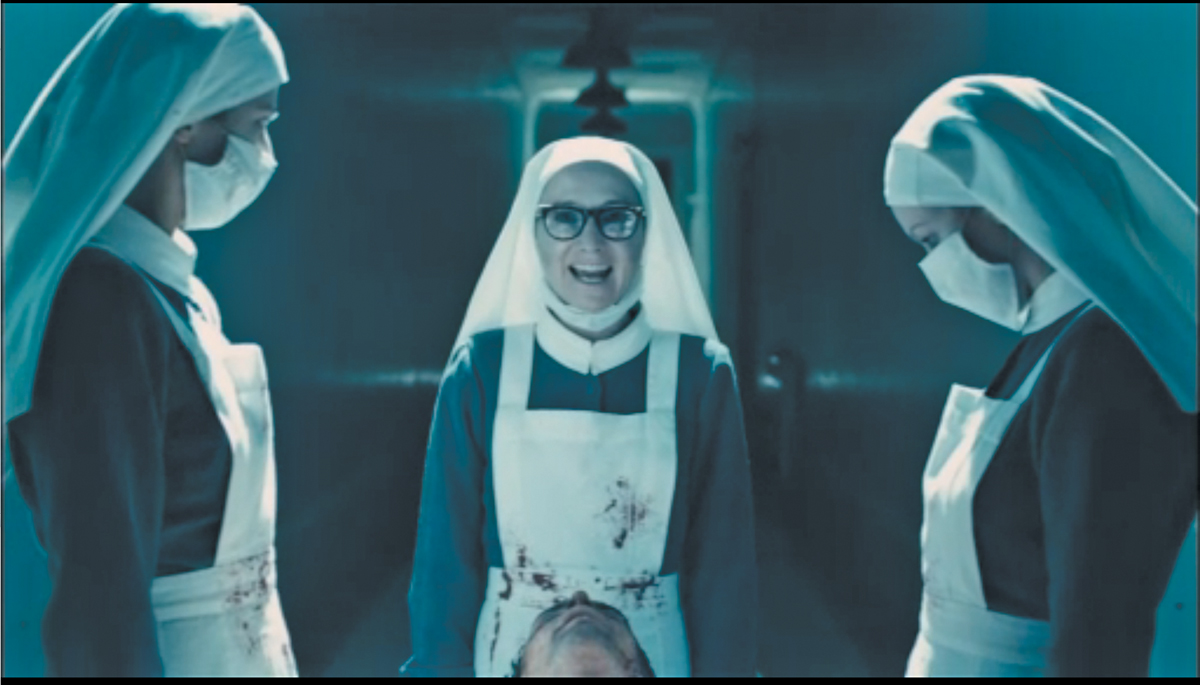
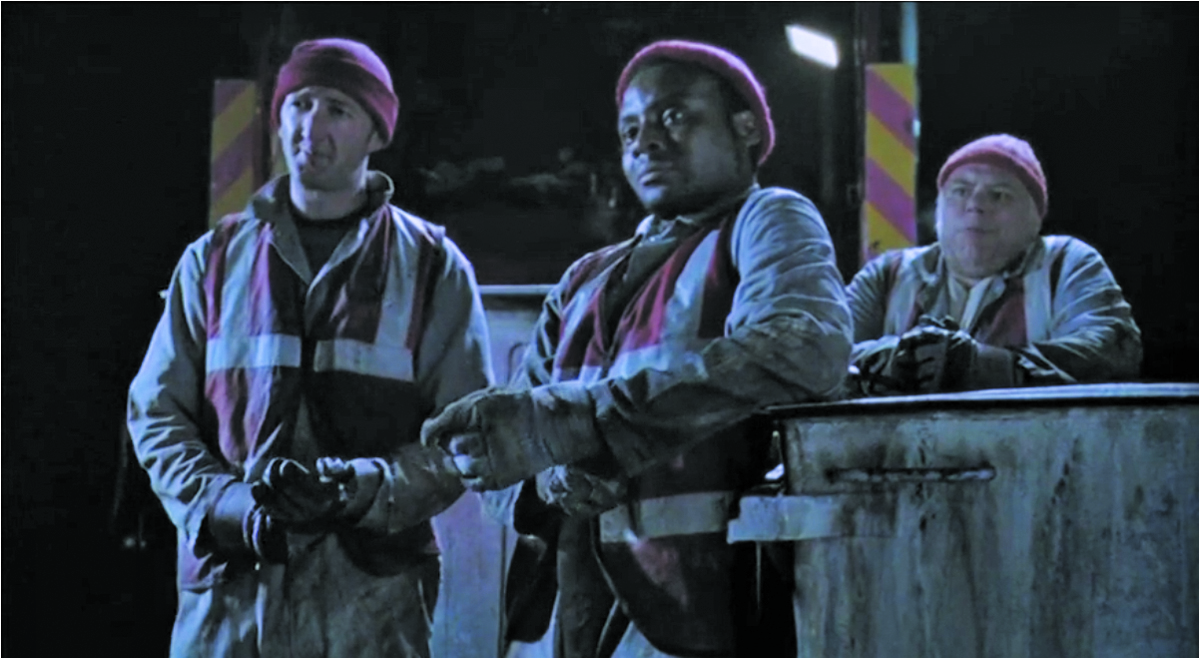
What is the effect of reimagining the witches in these ways? If you were directing a modern version, what choice would you make when deciding how to present the witches?
And Fortune, on his damnèd quarrel° smiling,
15 Showed° like a rebel’s whore. But all’s too weak;
For brave Macbeth — well he deserves that name° —
Disdaining Fortune, with his brandished steel,
Which smoked with bloody execution,
Like valor’s minion° carved out his passage
20 Till he faced the slave,°
Which° ne’er shook hands nor bade farewell to him°
Till he unseamed him from the nave° to th’ chops,°
And fixed his head upon our battlements.
DUNCAN O valiant cousin,° worthy gentleman!
25 CAPTAIN As whence° the sun ’gins his reflection°
Shipwrecking storms and direful thunders break,
So from that spring whence comfort seemed to come
Discomfort swells. Mark, King of Scotland, mark.
No sooner justice had, with valor armed,
30 Compelled these skipping° kerns to trust their heels
But the Norweyan lord, surveying vantage,°
With furbished arms and new supplies of men,
Began a fresh assault.
DUNCAN Dismayed not this our captains, Macbeth and Banquo?
35 CAPTAIN Yes, as sparrows eagles, or the hare the lion.
If I say sooth,° I must report they were
As cannons overcharged with double cracks,°
So they doubly redoubled strokes upon the foe.
Except° they meant to bathe in reeking wounds
40 Or memorize° another Golgotha,°
I cannot tell.
But I am faint. My gashes cry for help.
DUNCAN So well thy words become thee as thy wounds;
They smack of honor both. — Go get him surgeons.
[Exit Captain, attended.]
Enter Ross and Angus.
45 Who comes here?
MALCOLM The worthy Thane° of Ross.
LENNOX What a haste looks through his eyes!
So should he look that seems to° speak things strange.
ROSS God save the King!
DUNCAN Whence cam’st thou, worthy thane?
50 ROSS From Fife, great King,
Where the Norweyan banners flout° the sky
And fan our people cold.°
Norway° himself, with terrible numbers,°
Assisted by that most disloyal traitor,
55 The Thane of Cawdor, began a dismal° conflict,
Till that Bellona’s bridegroom, lapped in proof,°
Confronted him° with self-
Point against point, rebellious arm ’gainst arm,
Curbing his lavish spirit; and to conclude,
The victory fell on us.
60 DUNCAN Great happiness!
ROSS That now
Sweno, the Norways’° king, craves composition;°
Nor would we deign him burial of his men
Till he disbursèd at Saint Colme’s Inch°
65 Ten thousand dollars° to our general use.
DUNCAN No more that Thane of Cawdor shall deceive
Our° bosom° interest. Go pronounce his present° death,
And with his former title greet Macbeth.
ROSS I’ll see it done.
70 DUNCAN What he hath lost noble Macbeth hath won.
Exeunt.
Scene 3°
Thunder. Enter the three Witches.
FIRST WITCH Where hast thou been, sister?
SECOND WITCH Killing swine.
THIRD WITCH Sister, where thou?
FIRST WITCH A sailor’s wife had chestnuts in her lap,
5 And munched, and munched, and munched. “Give me,” quoth I.
“Aroint thee,° witch!” the rump-
Her husband’s to Aleppo gone, master o’ the Tiger;°
But in a sieve I’ll thither sail,
And like a rat without a tail
10 I’ll do,° I’ll do, and I’ll do.°
SECOND WITCH I’ll give thee a wind.
FIRST WITCH Thou’rt kind.
THIRD WITCH And I another.
FIRST WITCH I myself have all the other,°
15 And the very ports they blow,°
All the quarters that they know
I’ the shipman’s card°
I’ll drain him dry as hay.
Sleep shall neither night nor day
20 Hang upon his penthouse lid.°
He shall live a man forbid.°
Weary sev’nnights° nine times nine
Shall he dwindle, peak,° and pine.
Though his bark cannot be lost,
25 Yet it shall be tempest-
Look what I have.
seeing connections
Here are two paintings depicting Macbeth and Banquo’s meeting with the Weird Sisters. Notice the vast difference in how the witches are depicted.
Based on evidence from the text, which depiction do you prefer, either because it is most faithful to the text, or because it presents a compelling interpretation?
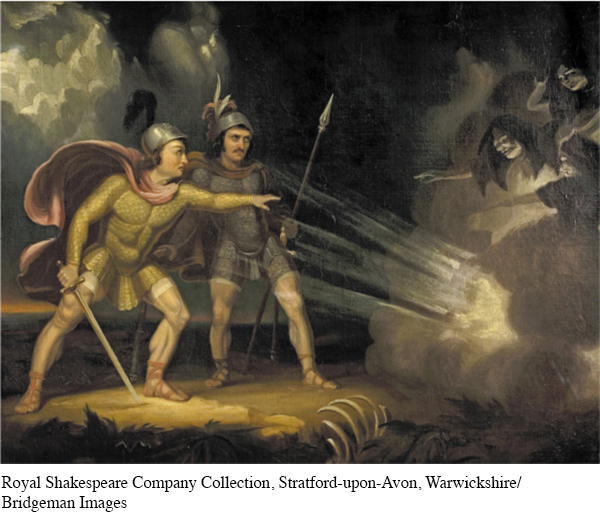
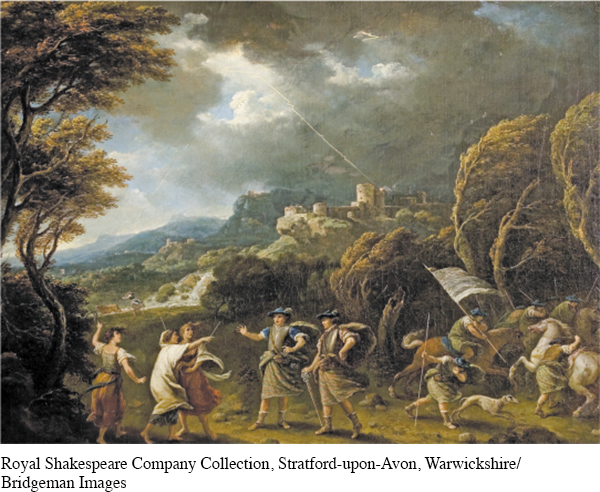
SECOND WITCH Show me, show me.
FIRST WITCH Here I have a pilot’s thumb,
Wrecked as homeward he did come. Drum within.
30 THIRD WITCH A drum, a drum!
Macbeth doth come.
ALL [dancing in a circle] The Weird Sisters,° hand in hand,
Posters of° the sea and land,
Thus do go about, about,
35 Thrice to thine, and thrice to mine,
And thrice again, to make up nine.
Peace! The charm’s wound up.
Enter Macbeth and Banquo
MACBETH So foul and fair a day I have not seen.
BANQUO How far is’t called° to Forres? — What are these,
40 So withered and so wild in their attire,
That look not like th’ inhabitants o’ th’ earth
And yet are on ’t? — Live you? Or are you aught
That man may question? You seem to understand me
By each at once her chappy° finger laying
45 Upon her skinny lips. You should be women,
And yet your beards forbid me to interpret
That you are so.
MACBETH Speak, if you can. What are you?
FIRST WITCH All hail, Macbeth! Hail to thee, Thane of Glamis!
SECOND WITCH All hail, Macbeth! Hail to thee, Thane of Cawdor!
50 THIRD WITCH All hail, Macbeth, that shalt be king hereafter!
BANQUO Good sir, why do you start and seem to fear
Things that do sound so fair? — I’ the name of truth,
Are ye fantastical° or that indeed
Which outwardly ye show?° My noble partner
55 You greet with present grace° and great prediction
Of noble having and of royal hope,
That he seems rapt withal.° To me you speak not.
If you can look into the seeds of time
And say which grain will grow and which will not,
60 Speak then to me, who neither beg nor fear
Your favors nor your hate.°
FIRST WITCH Hail!
SECOND WITCH Hail!
THIRD WITCH Hail!
65 FIRST WITCH Lesser than Macbeth, and greater.
SECOND WITCH Not so happy,° yet much happier.
THIRD WITCH Thou shalt get° kings, though thou be none.
So all hail, Macbeth and Banquo!
FIRST WITCH Banquo and Macbeth, all hail!
70 MACBETH Stay, you imperfect° speakers, tell me more!
By Sinel’s° death I know I am Thane of Glamis,
But how of Cawdor? The Thane of Cawdor lives
A prosperous gentleman; and to be king
Stands not within the prospect of belief,
75 No more than to be Cawdor. Say from whence
You owe this strange intelligence,° or why
Upon this blasted° heath you stop our way
With such prophetic greeting? Speak, I charge you.
Witches vanish.
BANQUO The earth hath bubbles, as the water has,
80 And these are of them. Whither are they vanished?
MACBETH Into the air; and what seemed corporal° melted,
As breath into the wind. Would they had stayed!
BANQUO Were such things here as we do speak about?
Or have we eaten on° the insane root°
85 That takes the reason prisoner?
MACBETH Your children shall be kings.
BANQUO You shall be king.
MACBETH And Thane of Cawdor too. Went it not so?
BANQUO To th’ selfsame tune and words. — Who’s here?
Enter Ross and Angus.
ROSS The King hath happily received, Macbeth,
90 The news of thy success; and when he reads°
Thy personal venture in the rebels’ fight,°
His wonders and his praises do contend
Which should be thine or his. Silenced with that,°
In viewing o’er the rest o’ the selfsame day
95 He finds thee in the stout Norweyan ranks,
Nothing° afeard of what thyself didst make,
Strange images of death. As thick as tale
Came post with post,° and every one did bear
Thy praises in his kingdom’s great defense,
And poured them down before him.
100 ANGUS We are sent
To give thee from our royal master thanks,
Only to herald thee into his sight,
Not pay thee.
ROSS And, for an earnest° of a greater honor,
105 He bade me, from him, call thee Thane of Cawdor;
In which addition,° hail, most worthy thane,
For it is thine.
BANQUO What, can the devil speak true?
MACBETH The Thane of Cawdor lives. Why do you dress me
In borrowed robes?
ANGUS Who°was the thane lives yet,
110 But under heavy judgment bears that life
Which he deserves to lose. Whether he was combined°
With those of Norway, or did line° the rebel°
With hidden help and vantage, or that with both
He labored in his country’s wrack,° I know not;
115 But treasons capital,° confessed and proved,
Have overthrown him.
MACBETH [aside] Glamis, and Thane of Cawdor!
The greatest is behind.° [To Ross and Angus]. Thanks for your pains.
[Aside to Banquo.] Do you not hope your children shall be kings
When those that gave the Thane of Cawdor to me
Promised no less to them?
120 BANQUO [to Macbeth] That, trusted home,°
Might yet enkindle you unto the crown,
Besides the Thane of Cawdor. But ’tis strange;
And oftentimes to win us to our harm
The instruments of darkness° tell us truths,
125 Win us with honest trifles, to betray ’s
In deepest consequence.° —
Cousins,° a word, I pray you. [He converses apart with Ross and Angus].
MACBETH [aside] Two truths are told,
As happy prologues to the swelling act°
130 Of the imperial theme. — I thank you, gentlemen.
[Aside.] This supernatural soliciting°
Cannot be ill, cannot be good. If ill,
Why hath it given me earnest of success
Commencing in a truth? I am Thane of Cawdor.
135 If good, why do I yield to that suggestion
Whose horrid° image doth unfix my hair
And make my seated heart knock at my ribs,
Against the use° of nature? Present fears°
Are less than horrible imaginings.
140 My thought, whose° murder yet is but fantastical,°
Shakes so my single state of man°
That function° is smothered in surmise,°
And nothing is but what is not.°
BANQUO Look how our partner’s rapt.
145 MACBETH [aside] If chance will have me king, why, chance may crown me
Without my stir.°
BANQUO New honors come° upon him,
Like our strange garments, cleave not to their mold
But with the aid of use.°
MACBETH [aside] Come what come may,
Time and the hour runs through the roughest day.°
150 BANQUO Worthy Macbeth, we stay° upon your leisure.
MACBETH Give me your favor.° My dull brain was wrought°
With things forgotten. Kind gentlemen, your pains
Are ° where every day I turn
The leaf to read them. Let us toward the King.
155 [Aside to Banquo.] Think upon what hath chanced, and at more time,°
The interim having weighed it, let us speak
Our free hearts° each to other.
BANQUO [to Macbeth] Very gladly.
MACBETH [to Banquo] Till then, enough. — Come, friends.
Exeunt.
Scene 4°
Flourish. Enter King [Duncan], Lennox, Malcolm, Donalbain, and attendants.
DUNCAN Is execution done on Cawdor? Are not
Those in commission° yet returned?
MALCOLM My liege,
They are not yet come back. But I have spoke
With one that saw him die, who did report
5 That very frankly he confessed his treasons,
Implored Your Highness’ pardon, and set forth
A deep repentance. Nothing in his life
Became him like the leaving it. He died
As one that had been studied° in his death
10 To throw away the dearest thing he owed°
As ’twere a careless° trifle.
DUNCAN There’s no art
To find the mind’s construction in the face.
He was a gentleman on whom I built
An absolute trust.
Enter Macbeth, Banquo, Ross, and Angus.
O worthiest cousin!
15 The sin of my ingratitude even now
Was heavy on me. Thou art so far before°
That swiftest wing of recompense is slow
To overtake thee. Would thou hadst less deserved,
That the proportion both of thanks and payment
20 Might have been mine!° Only I have left to say,
More is thy due than more than all can pay.
MACBETH The service and the loyalty I owe,
In doing it, pays itself. Your Highness’ part
Is to receive our duties; and our duties
25 Are to your throne and state children and servants,°
Which do but what they should by doing everything
Safe toward your love and honor.°
DUNCAN Welcome hither!
I have begun to plant thee, and will labor
To make thee full of growing. Noble Banquo,
30 That hast no less deserved, nor must be known
No less to have done so, let me infold thee
And hold thee to my heart.
BANQUO There if I grow,
The harvest is your own.
DUNCAN My plenteous joys,
Wanton° in fullness, seek to hide themselves
35 In drops of sorrow. — Sons, kinsmen, thanes,
And you whose places are the nearest, know
We° will establish our estate° upon
Our eldest, Malcolm, whom we name hereafter
The Prince of Cumberland;° which honor must
40 Not unaccompanied invest him only,°
But signs of nobleness, like stars, shall shine
On all deservers. — From hence to Inverness,°
And bind us further to you.°
MACBETH The rest is labor which is not used for you.°
45 I’ll be myself the harbinger° and make joyful
The hearing of my wife with your approach;
So humbly take my leave.
DUNCAN My worthy Cawdor!
MACBETH [aside] The Prince of Cumberland! That is a step
On which I must fall down or else o’erleap,
50 For in my way it lies.° Stars, hide your fires;
Let not light see my black and deep desires.
The eye wink at the hand;° yet let that be°
Which the eye fears, when it is done, to see. Exit.
DUNCAN True, worthy Banquo. He is full so valiant,°
55 And in his commendations° I am fed;
It is a banquet to me. Let’s after him,
Whose care is gone before to bid us welcome.
It is a peerless kinsman. Flourish. Exeunt.
Scene 5°
Enter Macbeth’s Wife, alone, with a letter.
LADY MACBETH [reads] “They met me in the day
of success; and I have learned by the
perfect’st° report they have more in them
than mortal knowledge. When I burnt in
5 desire to question them further, they made
themselves air, into which they vanished.
Whiles I stood rapt in the wonder of it
came missives° from the King, who all-
hailed me ‘Thane of Cawdor,’ by which
10 title, before, these Weird Sisters saluted
me, and referred me to the coming on of
time with ‘Hail, king that shalt be!’ This
have I thought good to deliver thee,° my
dearest partner of greatness, that thou
15 mightst not lose the dues of rejoicing by
being ignorant of what greatness is prom-
ised thee. Lay it to thy heart, and farewell.”
Glamis thou art, and Cawdor, and shalt be
What thou art promised. Yet do I fear° thy nature;
20 It is too full o’ the milk of human kindness
To catch the nearest way. Thou wouldst be great,
Art not without ambition, but without
The illness° should attend it. What thou wouldst highly,°
That wouldst thou holily; wouldst not play false,
25 And yet wouldst wrongly win. Thou’dst have, great Glamis,
That which cries “Thus thou must do,” if thou have° it,
And that which rather thou dost fear to do
Than wishest should be undone.° Hie° thee hither,
That I may pour my spirits in thine ear
30 And chastise with the valor of my tongue
All that impedes thee from the golden round°
Which fate and metaphysical° aid doth seem
To have thee crowned withal.°
Enter [a servant as] Messenger.
What is your tidings?
MESSENGER The King comes here tonight.
LADY MACBETH Thou’rt mad to say it!
35 Is not thy master with him, who, were ’t so,
Would have informed for preparation?°
MESSENGER So please you, it is true. Our thane is coming.
One of my fellows had the speed of° him,
Who, almost dead for breath, had scarcely more
40 Than would make up his message.
LADY MACBETH Give him tending;°
He brings great news. Exit Messenger
The raven himself is hoarse
That croaks the fatal entrance of Duncan
Under my battlements. Come, you spirits
That tend on mortal thoughts,° unsex me here
45 And fill me from the crown to the toe top-
Of direst cruelty! Make thick my blood;
seeing connections
The 1958 film Throne of Blood by legendary Japanese filmmaker Akira Kurosawa is an adaptation of Macbeth staged with distinct elements of traditional Japanese Noh theater.
Look at this scene, in which one of the witches gives the Macbeth character advice, saying, “If you choose ambition, lord . . . then choose it honestly, with cruelty.”
How is this advice similar to or different from Lady Macbeth’s observations in the soliloquy in Scene 5?
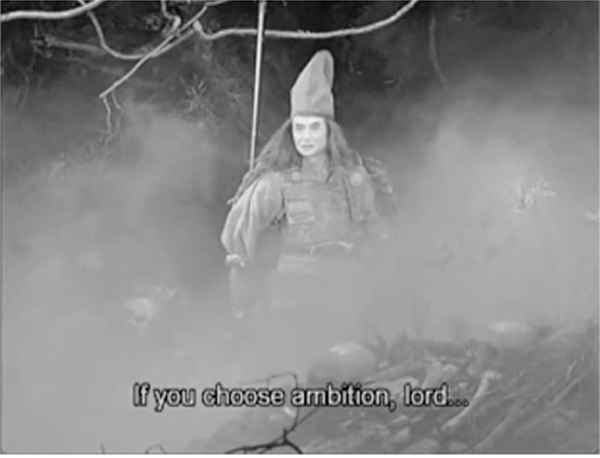
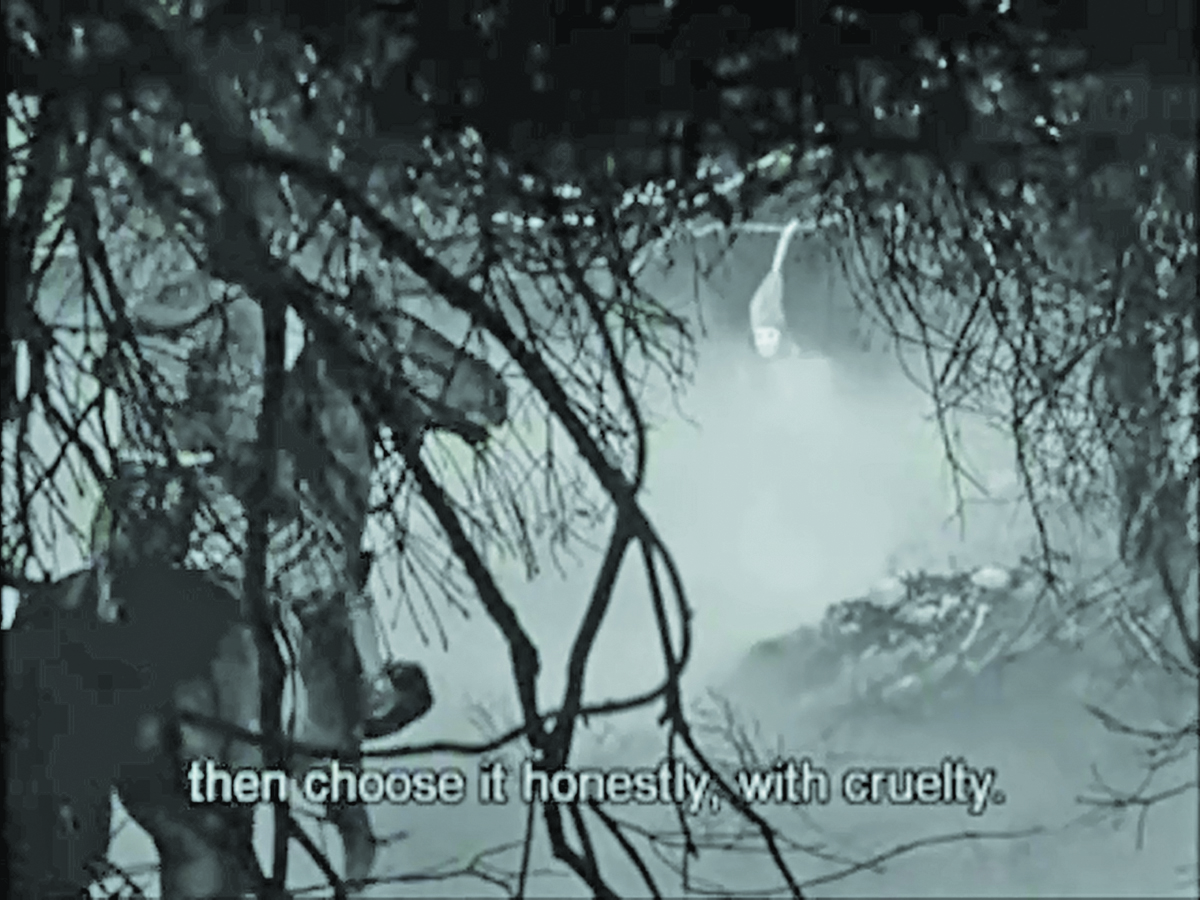
Stop up th’ access and passage to remorse,°
That no compunctious visitings of nature°
Shake my fell° purpose, nor keep peace° between
50 Th’ effect and it!° Come to my woman’s breasts
And take my milk for gall,° you murdering ministers,°
Wherever in your sightless° substances
You wait on° nature’s mischief!° Come, thick night,
And pall° thee in the dunnest° smoke of hell,
55 That my keen knife see not the wound it makes,
Nor heaven peep through the blanket of the dark
To cry “Hold, hold!”
Enter Macbeth.
Great Glamis! Worthy Cawdor!
Greater than both by the all-
Thy letters have° transported me beyond
60 This ignorant present, and I feel now
The future in the instant.
MACBETH My dearest love,
Duncan comes here tonight.
LADY MACOBETH And when goes hence?
MACBETH Tomorrow, as he purposes.
LADY MACBETH O, never
Shall sun that morrow see!
65 Your face, my thane, is as a book where men
May read strange matters. To beguile the time,°
Look like the time;° bear welcome in your eye,
Your hand, your tongue. Look like th’ innocent flower
But be the serpent under ’t. He that’s coming
70 Must be provided for; and you shall put
This night’s great business into my dispatch,°
Which shall to all our nights and days to come
Give solely sovereign sway and masterdom.
MACBETH We will speak further.
LADY MACBETH Only look up clear.°
75 To alter favor ever is to fear.°
Leave all the rest to me.
Exeunt.
Scene 6°
Hautboys° and torches. Enter King [Duncan], Malcolm, Donalbain, Banquo, Lennox, Macduff, Ross, Angus, and attendants.
DUNCAN This castle hath a pleasant seat.° The air
Nimbly and sweetly recommends itself
Unto our gentle° senses.
BANQUO This guest of summer,
The temple-
5 By his loved mansionry° that the heaven’s breath
Smells wooingly here. No jutty,° frieze,
Buttress, nor coign of vantage° but this bird
Hath made his pendent bed and procreant° cradle.
Where they most breed and haunt, I have observed
The air is delicate.
Enter Lady [Macbeth].
10 DUNCAN See, see, our honored hostess!
The love that follows us sometimes is our trouble,
Which still we thank as love.° Herein I teach you
How you shall bid God ’ild° us for your pains,°
And thank us for your trouble.
LADY MACBETH All our service
15 In every point twice done, and then done double,
Were poor and single° business to contend
Against° those honors deep and broad wherewith
Your Majesty loads our house. For those of old,°
And the late° dignities heaped up to° them,
We rest° your hermits.°
20 DUNCAN Where’s the Thane of Cawdor?
We coursed° him at the heels, and had a purpose
To be his purveyor;° but he rides well,
And his great love, sharp as his spur, hath holp° him
To his home before us. Fair and noble hostess,
We are your guest tonight.
25 LADY MACBETH Your servants ever
Have theirs, themselves, and what is theirs in compt
To make their audit at Your Highness’ pleasure,
Still to return your own.°
DUNCAN Give me your hand.
Conduct me to mine host. We° love him highly,
30 And shall continue our graces towards him.
By your leave, hostess.
Exeunt.
Scene 7°
Hautboys. Torches. Enter a sewer,° and divers servants with dishes and service, [and pass] over the stage. Then enter Macbeth.
MACBETH If it were done when ’tis done, then ’twere well
It were done quickly. If th’ assassination
Could trammel up the consequence,° and catch
With his surcease° success° — that but° this blow
5 Might be the be-
But here, upon this bank and shoal of time,
We’d jump° the life to come. But in these cases
We still have judgment° here, that° we but teach
Bloody instructions,° which, being taught, return
10 To plague th’ inventor. This evenhanded justice
Commends° th’ ingredience° of our poisoned chalice
To our own lips. He’s here in double trust:
First, as I am his kinsman and his subject,
Strong both against the deed; then, as his host,
15 Who should against his murderer shut the door,
Not bear the knife myself. Besides, this Duncan
Hath borne his faculties° so meek, hath been
So clear° in his great office, that his virtues
Will plead like angels, trumpet-
20 The deep damnation of his taking-
And Pity, like a naked newborn babe
Striding° the blast,° or heaven’s cherubin, horsed
Upon the sightless couriers° of the air,
Shall blow the horrid deed in every eye,
25 That tears shall drown the wind.° I have no spur
To prick the sides of my intent, but only
Vaulting ambition, which o’erleaps itself
And falls on th’ other° —
Enter Lady [Macbeth].
How now, what news?
30 LADY MACBETH He has almost supped. Why have you left the chamber?
MACBETH Hath he asked for me?
LADY MACBETH Know you not he has?
MACBETH We will proceed no further in this business.
He hath honored me of late, and I have bought°
Golden opinions from all sorts of people,
35 Which would° be worn now in their newest gloss,
Not cast aside so soon.
LADY MACBETH Was the hope drunk
Wherein you dressed yourself? Hath it slept since?
And wakes it now, to look so green° and pale
At what it did so freely? From this time
40 Such I account thy love. Art thou afeard
To be the same in thine own act and valor
As thou art in desire? Wouldst thou have that
Which thou esteem’st the ornament of life,°
And live a coward in thine own esteem,
45 Letting “I dare not” wait upon° “I would,”
Like the poor cat i’ th’ adage?°
MACBETH Prithee, peace!
I dare do all that may become a man;
Who dares do more is none.
LADY MACBETH What beast was ’t, then,
That made you break° this enterprise to me?
50 When you durst do it, then you were a man;
And, to be more than what you were, you would
Be so much more the man. Nor time nor place
Did then adhere,° and yet you would° make both.
They have made themselves, and that their fitness° now
55 Does unmake you. I have given suck, and know
How tender ’tis to love the babe that milks me;
I would, while it was smiling in my face,
Have plucked my nipple from his boneless gums
And dashed the brains out, had I so sworn as you
60 Have done to this.
MACBETH If we should fail?
LADY MACBETH We fail?
But° screw your courage to the sticking place°
And we’ll not fail. When Duncan is asleep —
Whereto the rather shall his day’s hard journey
Soundly invite him — his two chamberlains°
65 Will I with wine and wassail° so convince°
That memory, the warder of the brain,
Shall be a fume, and the receipt° of reason
A limbeck° only.° When in swinish sleep
Their drenchèd natures lies as in a death,
70 What cannot you and I perform upon
Th’ unguarded Duncan? What not put upon
His spongy° officers, who shall bear the guilt
Of our great quell?°
MACBETH Bring forth men-
For thy undaunted mettle° should compose
75 Nothing but males. Will it not be received,°
When we have marked with blood those sleepy two
Of his own chamber and used their very daggers,
That they have done ’t?
LADY MACBETH Who dares receive it other,°
As° we shall make our griefs and clamor roar
Upon his death?
80 MACBETH I am settled, and bend up
Each corporal agent° to this terrible feat.
Away, and mock° the time with fairest show.
False face must hide what the false heart doth know. Exeunt.
seeing connections
The 1990 film Men of Respect is an adaptation of Macbeth in which the protagonist, Mike Battaglia, is an Italian mobster trying to seize control of a crime family from the current “Padrino,” or Godfather, Charlie DeMico.
Read this bit of dialogue, in which Mike Battaglia’s wife, Ruthie, urges her husband to take action. What remains consistent with Macbeth, and what has changed?
Mike Battaglia: This is Padrino DeMico here. Alright? Now we have respect.
Ruthie Battaglia: Charlie respects the fat end of a bat. The sharp end of a stick.
Charlie respects what he fears. And that ain’t you.
Mike: You just wait and see what he has in mind.
Ruthie: All Charlie cares about is number one. Him and his. That’s why Charlie is Charlie, and you are not.
Why you have to wait for other people to give you?
Why does everything always have to pass through somebody else’s hands? Show a little ambition.
Mike: Stop it alright!? I’m as ambitious as the next guy.
More! Alright?
My time comes; I’ll know it. And I’ll know what to do.
Ruthie: This is the time. And you better know it now. This is it staring you in the face.
Don’t close your eyes.
Mike: You don’t know what you’re asking.
Ruthie: Tell me. Tell me you don’t want it.
If I was the man, I’d know what to do.
Mike: There’s no guarantee, if Charlie’s out of the picture, we’ll be any better off.
Ruthie: In this life Michael, there’s no safe standing still.
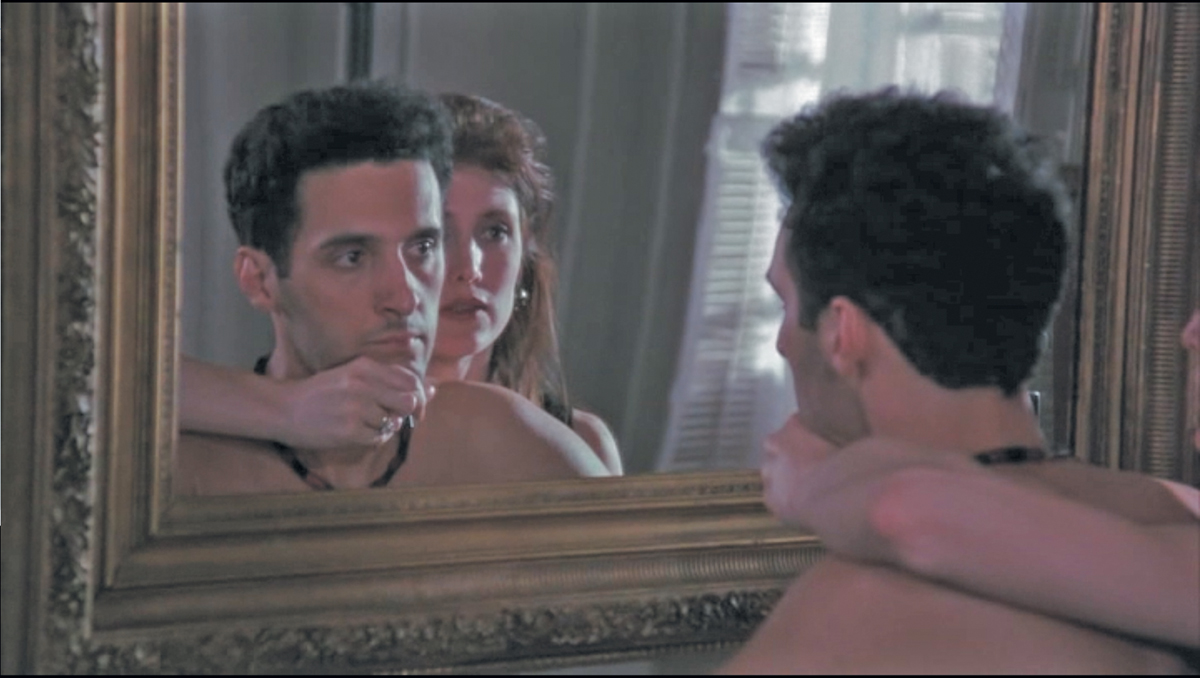
What does this image from the movie suggest about the power relationship between husband and wife? Is it similar to that of Macbeth and Lady Macbeth? What details helped you draw your conclusion?
Understanding and Interpreting
Right after the witches affirm that they are about to meet Macbeth, they declare, “Fair is foul, and foul is fair” (Scene 1, l. 11). Explain what this inversion of the natural order might foreshadow.
In Scene 2, the injured Captain is asked to explain to King Duncan the outcome of a battle he has just witnessed. Using direct quotes from the text, explain what we learn about Macbeth as a soldier.
Page 268“Thane” was a Scottish term for a nobleman whose position was dependent upon loyalty and service to the king. Disloyalty to the king was considered not only the highest dishonor, but also grounds for execution. In Scene 2, lines 66–
68, the current Thane of Cawdor is pronounced a traitor and sentenced to death, and his title is given to Macbeth. What does this immediate transfer of power suggest about the nature of a monarch’s authority during these times? What does it suggest about the nature of a thane’s authority? In Scene 3, the witches speak in ambiguous riddles. For example, they declare that Banquo will be “[l]esser than Macbeth, and greater” (l. 65). How does Macbeth react to this ambiguity, and what does that suggest about his character? How does Banquo’s reaction differ from Macbeth’s, and what does that suggest about his character?
Right after the witches disappear, Ross and Angusarrive to share the news that Macbeth is now the Thane of Cawdor, just as the witches had foretold (Scene 3, ll. 104–
107). Describe Macbeth and Banquo’s reaction. Are they excited about the news? Are they concerned? Or does each character have a unique reaction? Explain, using text from their conversation. In Scene 4, Macbeth starts to show two different sides now that he has been promoted. He declares publicly to Duncan that “[t]he service and the loyalty that I owe, / In doing it, pays itself” (ll. 22–
23). Yet, a few lines later he refers to the Prince of Cumberland, Duncan’s son, as a “step” he must “o’erleap” (ll. 48– 49). How do these contrasting sides of Macbeth begin to shape his character and increase the complexity of the play at this point? In contrast to Duncan’s earlier assertion that “There’s no art / To find the mind’s construction in the face” (Scene 4, ll. 11–
12), in Scene 5 Lady Macbeth tells her husband that his face is “as a book where men / May read strange matters” (ll. 65– 66). What does her contrasting opinion suggest about her character and her attitudes toward others? Shakespearean tragedies often feature a main character who possesses a fatal flaw. A fatal flaw is the primary personality trait responsible for a character’s downfall. At the end of his soliloquy in Scene 7, Macbeth refers to his “[v]aulting ambition” (l. 27), which is a phrase that many believe captures his fatal flaw. In what ways has Macbeth already shown his ambition, and to what degree has his ambition controlled the events in the play so far?
Lady Macbeth challenges Macbeth when she believes he may be wavering in his resolve to kill Duncan (Scene 7, ll. 48–
73). In making this response to Macbeth, does she intend to motivate him to follow through with the murder, or is she just telling him what he wants to hear? Explain. Explain how Lady Macbeth plans to kill Duncan without Macbeth’s getting blamed for the murder (Scene 7, ll. 62–
73).
Analyzing Language, Style, and Structure
The concept of Fortune, or Fate, was central to the worldview of this era as people considered it to be a central controlling force in life. In Scene 2, lines 16–
20, the Captain describes Macbeth as one who fought while “[d]isdaining Fortune.” In what ways does this description of Macbeth serve both as a compliment and as a hint as to what Macbeth’s character is like? In his extended description of the battle in Scene 2, the Captain employs several similes (ll. 7–
23). Identify one of the similes and discuss how it helps characterize the nature of the battle. Before the bleeding Captain is taken away to have his injuries treated, Duncan tells him that his “words become thee as thy wounds; / They smack of honor both” (Scene 2, ll. 43–
44). What does this statement reveal about the men’s attitude toward warfare? In Scene 3, after Angus and Ross tell of Macbeth’s promotion to Thane of Cawdor, Banquo suggests to Macbeth that sometimes “instruments of darkness tell us truths” to “win us to our harm” (ll. 123–
124). Explain what he means by this as well as why these words of caution might be significant at this point in the play. Macbeth is troubled by the prophecy of the witches, asserting that it “[c]annot be ill, cannot be good” (Scene 3, l. 132). This antithesis (two opposing ideas) is followed by two more antitheses. Identify those antitheses and explain what they reveal about Macbeth’s state of mind at this point.
Page 269When Banquo recognizes that Macbeth is struggling to understand his promotion to Thane of Cawdor, he concludes that the new “honors” bestowed on Macbeth are like “strange garments” that “cleave not to their mold / But with the aid of use” (Scene 3, ll. 146–
148). Discuss why this simile is an effective way to describe Macbeth’s current attitude toward his promotion. Duncan muses that the recently executed Cawdor was “a gentleman on whom I built / An absolute trust” (Scene 4, ll. 13–
14). Just after Duncan says these words, Macbeth enters. How does timing Macbeth’s entrance right after Duncan’s comment affect the play at this point? Scene 7 opens with Macbeth’s first major soliloquy (ll. 1–
28). Soliloquies offer characters a chance to reveal their private thoughts and inner turmoil. Taking all of Macbeth’s soliloquy into account, do you think he is ready to kill Duncan? Or does he still have doubts? Use evidence from the text to explain your reasoning. Lady Macbeth uses particularly violent imagery related to a baby when she confronts Macbeth about “[breaking] this enterprise” and not following through with the murder (Scene 7, ll. 49–
60). In what ways does the imagery emphasize Lady Macbeth’s resolve, and what does it suggest about her character?
Connecting, Arguing, and Extending
Letters written from the battlefield have long been a part of how civilians at home learn about the events that soldiers experience in war. Imagine you were at the battle that Macbeth just fought. Using details from the Captain’s description in Scene 2, write a letter to someone at home about what you witnessed.
The witches are described in some detail by Banquo when he and Macbeth encounter them on the heath (Scene 3, ll. 39–
47). There are many imaginative works that include witches, including many children’s stories. Taking Banquo’s description into account, as well as popular images of witches, explain how these witches might be staged today. What features should be emphasized to create particularly fearsome characters? If you like, you may use images or video to help your audience visualize your version of this scene. A self-
fulfilling prophecy is a prediction that leads to behavior that causes the prediction to come true. For example, imagine that a player at a basketball game hears someone in the stands say, “That kid will never make varsity.” The player thinks the comment is directed at her. She gets discouraged, stops practicing, and doesn’t make varsity. That original comment becomes a self-fulfilling prophecy. What if the person in the stands was actually talking about someone else? What if the player responded to the comment by working even harder? Do a bit of research on the psychology behind how self- fulfilling prophecies work, and then write an expository essay in which you investigate the role that a self- fulfilling prophecy played in a current day example. It is clear that Macbeth desires to be king, but he is also a loyal soldier who understands that killing the current king would be an act of treason. This struggle between ambition and restraint is central to the action of the play.
Consider other pieces you have read, in this book or elsewhere, that involved a significant choice a character had to make. Identify the context of the decision, summarize the decision, and discuss how the motivation behind that decision compares to or contrasts with Macbeth’s motivation.
A traditional proverb says that the eyes are the window to the soul. In Scene 4, lines 11–
12, Duncan suggests that you cannot tell what’s really going on inside someone’s mind just by looking at that person’s face. Do some research into facial expressions or law enforcement lie- detecting techniques, and then write an argument in which you contend either that Duncan or the traditional proverb is closer to the truth. Macbeth offers specific ideas about gender. Look back through Act 1 and find as many references as you can to gender roles or the nature of men and women. Then, do some research about the Jacobean period, the time the play was written, and write a response discussing how the historical accounts of gender roles compare to or contrast with the gender roles you find in Macbeth.
Act 1 offers a number of different settings and significant actions in each place. Write seven different headlines, one for each scene. Then, using either original images or images from the Internet, design and create a picture that would be appropriate for each headline.